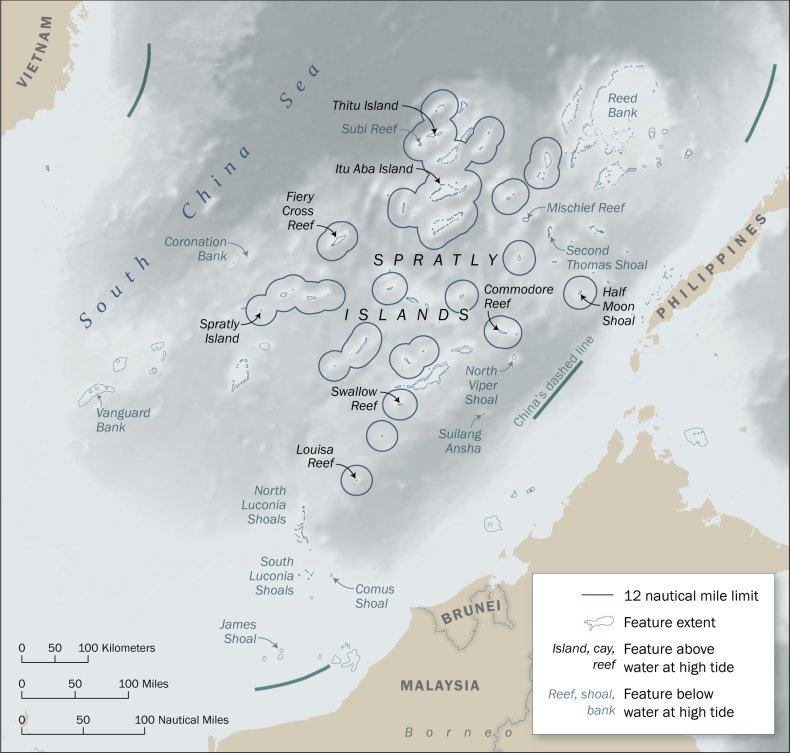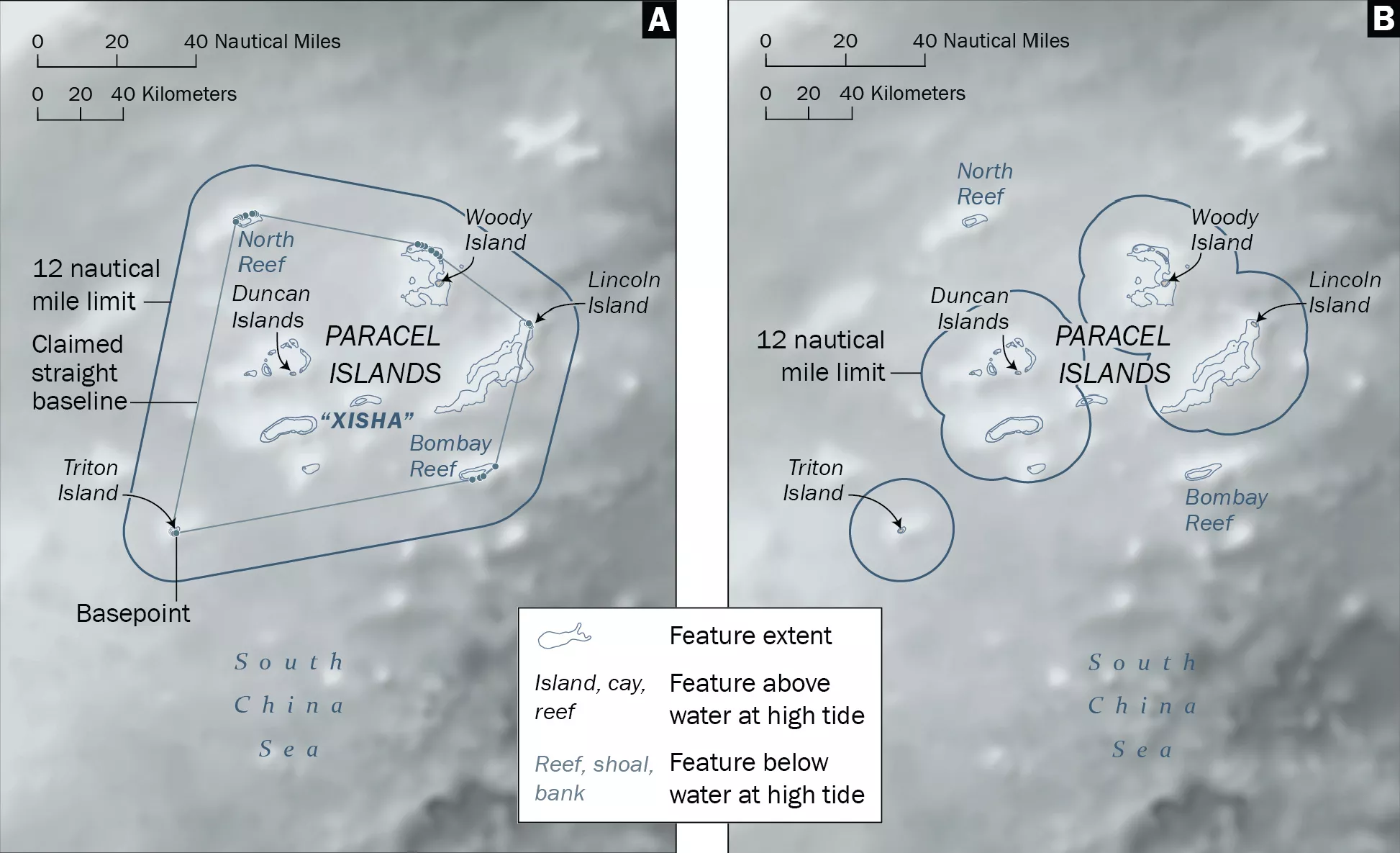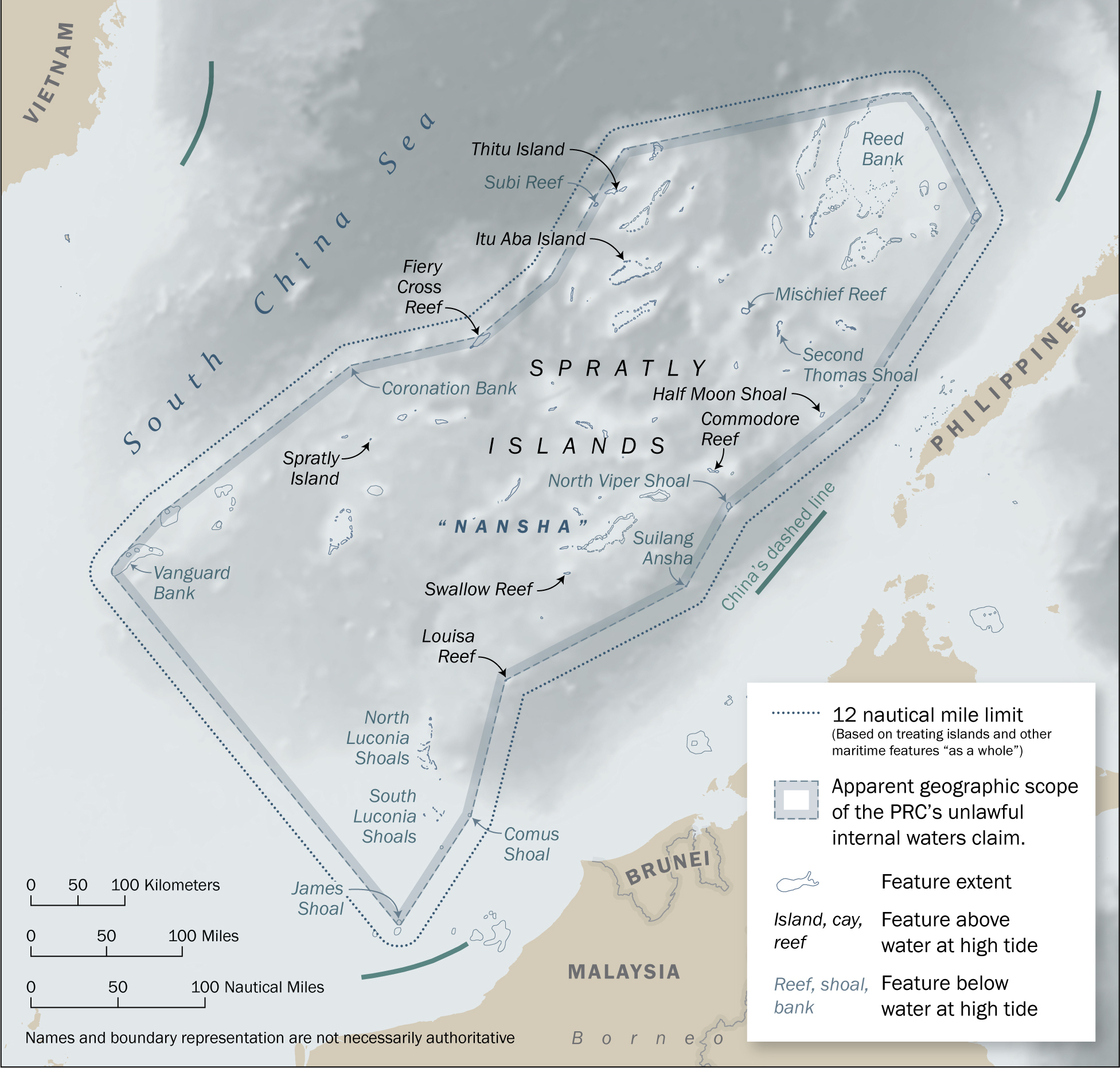The map was released in a State Department report titled Limits in the Seas No.
150, on January 12, 2022, which found China’s sweeping claims to most of the South China Sea inconsistent with international law.
The United States has provided its most comprehensive rejection of China's claims to vast swathes of the South China Sea in a 44-page study published by the State Department on Wednesday.
The People's Republic of China (PRC) asserts what it calls "historic rights" to every island within its "nine-dash line," claiming jurisdiction over waters surrounding hundreds of features in the sea, including those submerged beneath the surface.
The report, Limits in the Seas No. 150, assesses China's maritime rather than territorial claims against provisions of the 1982 United Nations Convention on the Law of the Sea (UNCLOS).

The map was released in a State Department report titled Limits in the Seas No.
150, on January 12, 2022, which found China’s sweeping claims to most of the South China Sea inconsistent with international law.
Under the convention, which China ratified in 1996, such features cannot be lawfully claimed or generate maritime zones.
Beijing not only claims ownership of submerged features, but also joins otherwise geographically disparate areas together to create "straight baselines," drawing large blocks of exclusive waters around archipelagoes in the energy-rich sea.
These zones, the report said, appear to exist around four groups: the Pratas (Dongsha), Paracel (Xisha), and Spratly (Nansha) and Zhongsha islands.
Additionally, China, by treating each island group as one unit, asserts claims to internal waters, a territorial sea, an exclusive economic zone and a continental shelf.
The practice is inconsistent with UNCLOS, which only allows the drawing of baselines under limited circumstances—an indented coastline or islands in the immediate vicinity of the coast—the authors found.
Lastly, the study determined there was no legal basis for China to assert "historic rights" in the South China Sea.
Beijing has never provided a legal rationale for its claim.
"No provision of the Convention contains the term 'historic rights,' nor is there a uniform understanding of what, specifically, the term means as a matter of international law," the report said.
"For this reason, the United States and numerous other States have rejected these claims in favor of the rules-based international maritime order within the South China Sea and worldwide," wrote principal authors Kevin Baumert, Amy Stern and Amanda Williams, who conducted the research for the Office of Ocean and Polar Affairs under the Bureau of Oceans and International Environmental and Scientific Affairs at the State Department.
The study reaffirmed American backing for a 2016 ruling by the Permanent Court of Arbitration in The Hague, which dismissed China's extensive "nine-dash line" claims in the verdict of Philippines v.
"With the release of this latest study, the United States calls again on the PRC to conform its maritime claims to international law as reflected in the Law of the Sea Convention, to comply with the decision of the arbitral tribunal in its award of July 12, 2016, in The South China Sea Arbitration, and to cease its unlawful and coercive activities in the South China Sea," the State Department said in an accompanying statement.
 Illustrative maps of the Xisha (Paracel) Islands, (A) showing China’s claimed straight baselines and territorial sea limits and (B) showing the appropriate 12-nautical mile territorial sea limits from lawful baselines.
Illustrative maps of the Xisha (Paracel) Islands, (A) showing China’s claimed straight baselines and territorial sea limits and (B) showing the appropriate 12-nautical mile territorial sea limits from lawful baselines.The maps were released in a State Department report titled Limits in the Seas No.
150, on January 12, 2022, which found China’s sweeping claims to most of the South China Sea inconsistent with international law.
The maps were released in a State Department report titled Limits in the Seas No.
150, on January 12, 2022, which found China’s sweeping claims to most of the South China Sea inconsistent with international law.
The detailed analysis, which is certain to serve as a key reference in further research and public debate on the subject, drew an immediate response from the Chinese government on Thursday, but it repeated positions already addressed in the U.S.
study and failed to answer outstanding questions surrounding their legitimacy.
China's Foreign Ministry spokesperson Wang Wenbin said the study "distorts international law, confuses the public, sows discord and disrupts the regional situation."
He said: "China has historic rights in the South China Sea.
China's sovereignty and related rights and interests in the South China Sea have been established over a long period of history and are consistent with international law, including the UN Charter and the UN Convention on the Law of the Sea."
He repeated China's rejection in full of the 2016 ruling in The Hague, calling the verdict "illegal, null and void."
Links :



No comments:
Post a Comment